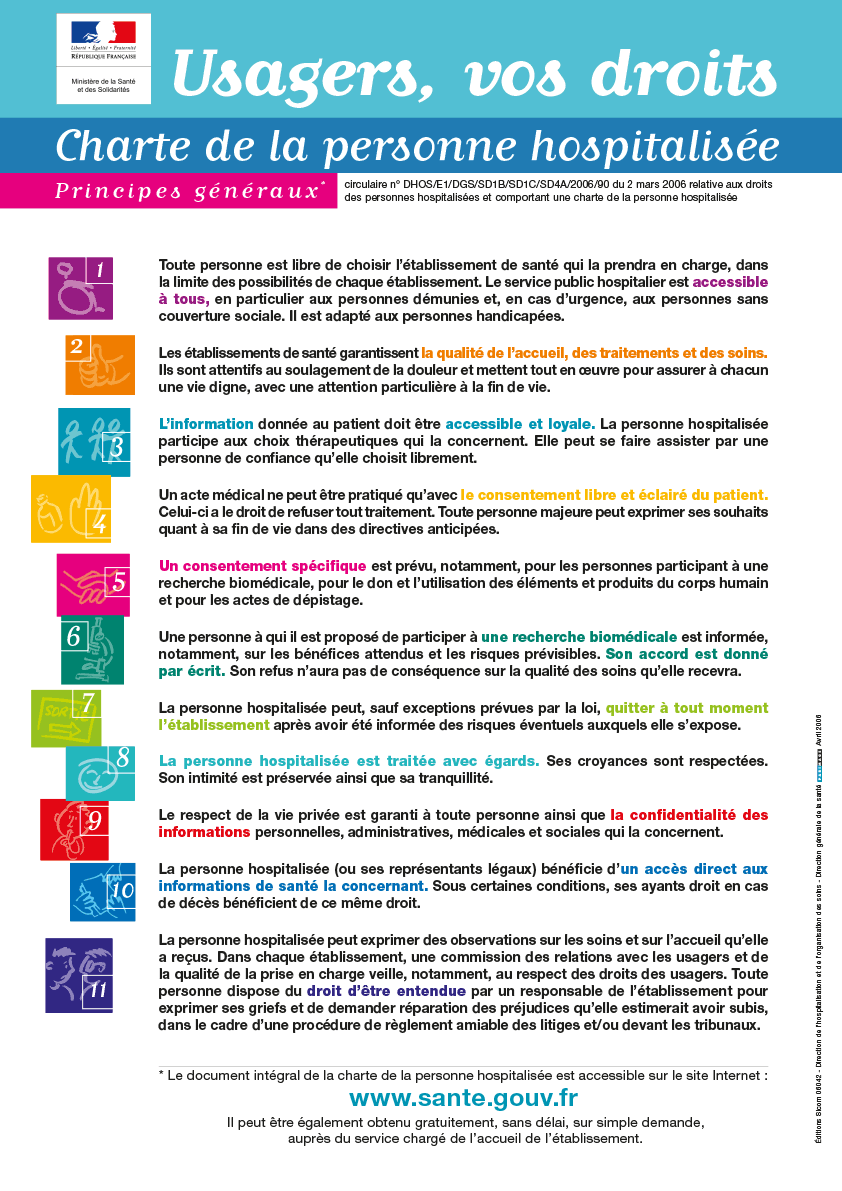In the interest of everyone, please consider the following :
- respect other patients and allow them to rest,
- do not prevent the department from operating effectively,
- dress appropriately when you come to the Victor Hugo Clinic,
- keep the facilities and the material provided in good condition.
For your safety and well-being:
- The Victor Hugo Clinic is a health facility and a public place. It is strictly forbidden to smoke inside the clinic in accordance with Decree 2006-1386 dated 15 November 2006 (Evin Law). Similarly, the use of electronic cigarettes is prohibited.
- Illegal products and alcoholic drinks are not allowed within the clinic, including for visitors.
- Silence enhances the comfort and recovery of patients. Therefore it is obligatory throughout the clinic. We ask that you and your families respect this requirement. Remember to bring headphones or earphones with you to listen to music or watch TV.
- Please keep your mobile phone or tablet switched off to limit the waves emitted as they may interact with some medical equipment.
- Animals are not allowed into the Victor Hugo Clinic
- Do not bring valuable objects. If necessary, we can put them in the safe at your request or in the individual safety deposit box in your room. The Victor Hugo Clinic declines all responsibility for any valuables left in your room.
Visits
Visits from friends and family are a source of great comfort. However, for reasons of hygiene and respecting patients’ rest, please limit the number of visitors at any one time in your room.
We do not recommend that children under 15 years of age visit you at the Victor Hugo Clinic. Children can be carriers of specific diseases that are not very dangerous at their age, but which can be potentially more serious if they affect adults, especially weakened people.
In the event of fire, all fire safety regulations in force are complied with at the clinic. Evacuation instructions are posted in all common areas. Remain calm and follow the instructions of trained personnel.
Patients’ Charter
- Everyone is free to choose the healthcare facility they wish, within the limits of the services provided by each facility. Public hospitals are open
to all, in particular to the impoverished and, in emergencies, to people without national health insurance. They are adapted to people with disabilities. - Healthcare facilities guarantee the quality of reception, treatment and care. They focus on relieving pain and do their utmost to help everyone live with dignity, in particular at the end of life.
- The information provided to patients must be accessible and honest. Patients participate in choosing the therapies that concern them. They may be assisted by a trusted person that they have chosen freely.
- A medical procedure can only be taken with the free and informed consent of the patient. The patient has the right to refuse any treatment. Any adult can express their end-of-life wishes in advance directives.
- Specific consent is required for those participating in biomedical research, for the donation and use of parts and products of the human body, and for screening and testing.
- People who are invited to take part in biomedical research are informed of the expected benefits and foreseeable risks. They must give their consent in writing. Refusal will not affect the quality of care they receive.
- Except where otherwise provided for by law, patients may leave the facility at any time once they have been informed of the possible risks they incur.
- Patients are treated with respect. His or her beliefs will be respected. Their privacy and peace of mind will be preserved.
- Respect for each person’s private life is guaranteed, as is the confidentiality of the personal, administrative, medical and social information that concerns him or her.
- Patients (or their legal representatives) have direct access to the health data that concerns them. Under certain conditions, this right will be transferred to the patient’s beneficiaries in case of death.
- Patients may comment on the care and reception they receive. Each clinic has a Committee for User Relations and Care Quality which ensures, in particular, that users’ rights are respected. Everyone has the right to be heard by a manager at the clinic in order to express their grievances and request compensation for the harm they feel they have suffered, through a procedure for the amicable resolution of disputes and/or before a court of law.

